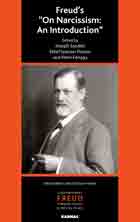Freud's Models of the Mind: An Introduction
Part of The Psychoanalytic Monograph series - more in this series

Book Details
- Publisher : Routledge
- Published : 1997
- Cover : Paperback
- Pages : 224
- Category :
Psychoanalysis - Catalogue No : 4446
- ISBN 13 : 9781855751675
- ISBN 10 : 1855751674
Also by Alex Holder
Also by Joseph Sandler
Freud's "On Narcissism: An Introduction"
Price £34.99
Also by Christopher Dare
There are currently no reviews
Be the first to review
The authors succeed in putting Freud's models of the mind into a historical and developmental framework and show the complexity of his thinking on the relationship between the conscious and unconscious mind.
Reviews and Endorsements
'There are, of course, many ways of trying to make sense of Freud's models of the mind. [The authors] are quite aware of the difficulties and risks involved in presenting and schematising Freud's complexity of thinking and the polyphonic nuances of his attempts to map the relationship between out conscious and unconscious life. With a great sense of modest,y but also with a refreshing honesty and timely awareness of current debates in other fields of historical research, the authors stress the inevitable distortions inherent in any attempt to reconstruct historically even Freud's thinking. Yet they have succeeded admirably in their task, led by Sandler's well-known clarity of mind and talmudic subtlety in analysing and defining the meaning of Freud's concepts and general ideas, observing their transformation, and putting them into a historical, developmental, but not mechanical frame. This book is a must for everybody, regardless of what school or trend of psychoanalysis they belong to, for it enables us to understand how even contemporary psychoanalysis is still creatively rooted in the work of its founders.'
- Riccardo Steiner
'The authors have held firm to their original intent to present the structure of Freud's own work and thought as systematically as possible, given all the twists and even contradictions in Freud's developmental progression. This can serves as a conceptual springboard for both neophyte and seasoned analyst better to navigate our burgeoning literature, keeping in mind the transformed derivations from and elaborations upon Freud, as well as the clear departures from – and even repudiations of – other tenets of his overall body of work.'
- Robert S. Wallerstein
About the Editor(s)
Joseph Sandler qualified as a psychoanalyst in the British Psychoanalytical Society. He was the Freud Memorial Professor of Psychoanalysis in the University of London and Director of the Psychoanalysis Unit at University College London, and in private practice in London. He was formerly the first Sigmund Freud Professor of Psychoanalysis at the Hebrew University of Jerusalem, Editor of the International Journal of Psychoanalysis and the International Review of Psychoanalysis, and was President of the International Psychoanalytical Association.
Alex Holder trained in London at the Anna Freud Center and the British Psychoanalytical Society. He is a member of the German Psychoanalytical Association and heads the Department for Analytic Child and Adolescent Psychotherapy at the Michael Balint Institute in Hamburg. He is also the Editor of the Bulletin of the European Psychoanalytical Federation.
Christopher Dare received his psychoanalytic training in London, and for twenty years combined private practice in psychoanalysis with a Consultant post in Child and Adolescent Psychiatry at the Bethlem and Maudsley Hospitals, London. He also holds an academic position at the Institute of Psychiatry, University of London, developing research into psychotherapy.
More titles by Christopher Dare
Anna Ursula Dreher trained as a psychoanalyst in the German Psychoanalytic Association. After working at the Social Psychological Research Centre of the University of Saarbrucken, she spent six years at the Sigmund Freud Institute, Frankfurt, and was involved in research on psychoanalytic concepts. She is now in private practice in Frankfurt, and lectures in psychoanalysis and psychology at the universities of Hanover and Giessen.
Customer Reviews
Our customers have not yet reviewed this title. Be the first add your own review for this title.










